6 Aug 2014 | Azerbaijan Statements, News and features, Statements

Rasul Jafarov, Arif Yunus and Leyla Yunus (Photos: Rasul Jafarov (© IRFS), Arif and Leyla Yunus (© HRHN))
60 NGOs from 13 Human Rights Houses call upon the Azerbaijani authorities, in their joint letter to President Ilham Aliyev, to immediately and unconditionally release Leyla Yunus, Arif Yunus and Rasul Jafarov, and lift all charges held against them. The NGOs also repeat their previous call to release Anar Mammadli and Bashir Suleymanli, and join calls for the release of Hasan Huseynli.
On 28 April 2014 Leyla Yunus, Director of the Institute for Peace and Democrac, and her husband historian Arif Yunus, were prevented from leaving the country at Baku’s airport. Leyla Yunus and her husband Arif Yunus were arrested on 30 July 2014. On that day, Leyla Yunus was sentenced to 3-months pre-trial detention, whilst her husband was placed under police guard and not allowed to leave Baku. The charges brought against Leyla Yunus are those of state treason (article 274 of the Criminal Code of the Republic of Azerbaijan), large-scale fraud (article 178.3.2), forgery (article 320), tax evasion (article 213), and illegal business (article 192). Arif Yunus was arrested on 5 August 2014 and also sentenced to 3-months pre-trial detention.
The NGOs state in their joint letter to President Aliyev of 5 August 2014 that they are in particular concerned about Leyla Yunus’ health whilst in detention. She suffers from diabetes and needs appropriate medication, as well as arrangements to eat at certain times, necessary to control the illness. We worry that the conditions in detention will have a detrimental effect on her health condition, as it appears that she is to date not provided with adequate health care.
In July 2014, the bank accounts of, amongst others, human rights defender Rasul Jafarov were frozen as part of a broader investigation into numerous NGO’s. On 25 July he was refused to leave the country. Rasul Jafarov was arrested on 2 August 2014, and sentenced to 3 months pre-trial detention on charges of tax evasion (article 213 of the Criminal Code of the Republic of Azerbaijan), illegal business (article 192) and abuse of authority (article 308.2).
On 14 July 2014, Hasan Huseynli, was sentenced to 6 years in prison. He was convicted on charges of armed hooliganism and unlawfully carrying a cold weapon.
The right to freedom of association is at the heart of the charges held against these human rights defenders. In essence they are deprived of their right to work in the defence of human rights. While registration of NGOs and grants to NGOs has become mandatory in Azerbaijan, authorities continue deny registration. Independent NGOs face continuous investigations and human rights defenders are being banned from travelling abroad, depending on their willingness to find agreements with the government, including agreements on their professional activities and their public statements.
Restrictions to laws affecting the right to freedom of association have been widely criticised since October 2011. Such legislation de facto criminalises human rights defenders in Azerbaijan, not for their wrong doing, but rather for the fact that working for an NGO, which does not have the blessing of the government, has become difficult in Azerbaijan. United Nations experts stated ahead of the Presidential elections that they “observed since 2011 a worrying trend of legislation which has narrowed considerably the space in which civil society and defenders operate in Azerbaijan.” The order given to the Human Rights House Azerbaijan in March 2011 to cease all its activities is a consequence of such policies.
The NGOs call upon the Azerbaijani authorities, in their joint letter to President Ilham Aliyev of 5 August 2014, to immediately and unconditionally release Leyla Yunus, Arif Yunus, Rasul Jafarov, and lift all charges held against them. The NGOs see this pre-trial detention of Leyla Yunus, Arif Yunus and Rasul Jafarov as a way to silence them. The NGOs also repeat their previous call to release Anar Mammadli and Bashir Suleymanli, and join calls for the release of Hasan Huseynli.
The NGOs further call upon the Azerbaijani authorities to take appropriate measures to put an end to the attacks, detention and harassment of human rights defenders, journalists and activists, and to take steps in order to foster a safe environment for them, in line with Azerbaijan’s international obligations and commitments, especially as the chair of the Committee of Ministers of the Council of Europe.
Signed by:
Human Rights House Azerbaijan (on behalf of the following NGOs):
- Association for the Protection of Women’s Rights
- Azerbaijan Lawyers Association
- Institute for Reporters’ Safety and Freedom
- Legal Education Society
- Media Rights Institute
- Society for Humanitarian Research
- Women Association for Rational Development
Barys Zvozskau Belarusian Human Rights House in exile, Vilnius (on behalf of the following NGOs):
- Belarusian Association of Journalists
- Belarusian Helsinki Committee
- City Public Association “Centar Supolnaść”
- Human Rights Centre “Viasna”
Human Rights House Belgrade (on behalf of the following NGOs):
- Belgrade Centre for Human Rights
Human Rights House Kiev (on behalf of the following NGOs):
- Association of Ukrainian Human Rights Monitors on Law-Enforcement
- Human Rights Information Centre
- Center for Civil Liberties
- Ukrainian Helsinki Human Rights Union
- Ukrainian Legal Aid Foundation
Human Rights House London (on behalf of the following NGOs):
- Article 19
- Index on Censorship
Human Rights House Sarajevo (on behalf of the following NGOs):
- Helsinki Committee for Human Rights in Bosnia and Herzegovina
Human Rights House Tbilisi (on behalf of the following NGOs):
- Article 42 of the Constitution
- Georgian Centre for Psychosocial and Medical Rehabilitation of Torture Victims
- Human Rights Centre
Human Rights House Oslo (on behalf of the following NGOs):
- Human Rights House Foundation
- Norwegian Burma Committee
- Norwegian Helsinki Committee
Human Rights House Voronezh (on behalf of the following NGOs):
- Charitable Foundation
- Civic Initiatives Development Centre
- Confederation of Free Labor
- For Ecological and Social Justice
- Free University
- Golos
- Interregional Trade Union of Literary Men
- Lawyers for labor rights
- Memorial
- Ms. Olga Gnezdilova
- Soldiers Mothers of Russia
- Voronezh Journalist Club
- Voronezh-Chernozemie
- Youth Human Rights Movement
Human Rights House Yerevan (on behalf of the following NGOs):
- Helsinki Citizens’ Assembly-Vanadzor
- Helsinki Association for Human Rights
- Journalists’ Club “Asparez”
- Public Information and Need of Knowledge NGO
- Shahkhatun
- Women’s Resource Center
Human Rights House Zagreb (on behalf of the following NGOs):
- APEO/UPIM Association for Promotion of Equal Opportunities for People with Disabilities
- B.a.B.e.
- CMS – Centre for Peace Studies
- Documenta – Centre for Dealing with the Past
- GOLJP – Civic Committee for Human Rights
- Svitanje – Association for Protection and Promotion of Mental Health
The Rafto House in Bergen, Norway (on behalf of the following NGOs):
The House of the Helsinki Foundation For Human Rights, Poland (on behalf of the following NGOs):
- Helsinki Foundation for Human Rights
Election Monitoring and Democracy Studies Center, Azerbaijan
Foundation “Multiethnic Resource Center for Civic Education Development”, Georgia
People in Need, Czech Republic
Public Movement Multinational, Georgia
Public Association for Assistance to Free Economy, Azerbaijan
Public Union of Democracy and Human Rights Resource Centre, Azerbaijan
This statement was originally posted on Aug 5, 2014 at http://humanrightshouse.org/Articles/20321.html
16 Apr 2015 | Azerbaijan, Azerbaijan News, Europe and Central Asia, mobile, News and features
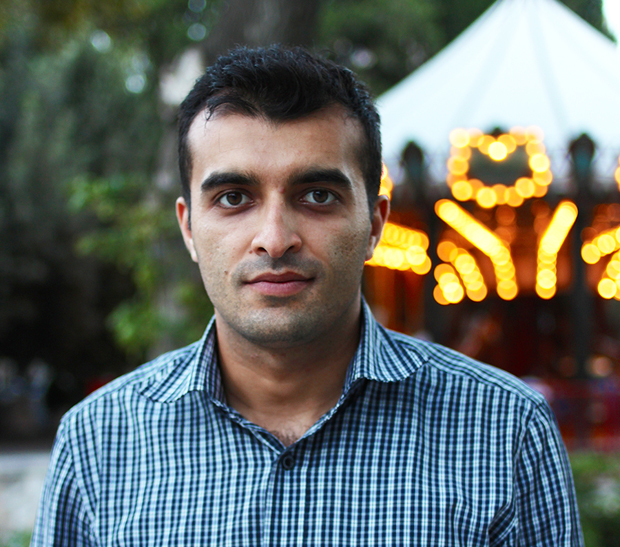
Rasul Jafarov (Photo: Melody Patry)
Rasul Jafarov, one of Azerbaijan’s best-known human rights activists and government critics, was sentenced on 16 April to six years and six months in prison on charges including tax evasion and abuse of power. He has also been barred from holding any office for three years following his release, reports contact.az.
The charges have been widely dismissed as trumped up and linked to Jafarov’s campaigning work in a country that has been continually criticised for its poor human rights record. Jafarov was notably behind the Sing For Democracy campaign when Azerbaijan hosted the Eurovision Song Contest in 2012, and among other things met with eventual winner Loreen to discuss the human rights situation in the country. When he was arrested in August 2014, Jafarov was also planning a Sports For Rights campaign in connection with this summer’s inaugural European Games. Backed by the European Olympic Committees (EOC), the games will be held in the capital Baku from 12 June.
“The sentencing of Rasul Jafarov is just the latest chapter in Azerbaijan’s ongoing attack on civil society. We must not allow the glitz of the Baku 2015 European Games to whitewash President Ilham Aliyev’s abysmal record on human rights,” said Index CEO Jodie Ginsberg.
After the announcement of the verdict, Jafarov said he believes the case against him is fabricated and politically motivated.
Jafarov’s arrest is part of an unprecedented crackdown on prominent journalists, activists and others critical of the leadership of President Aliyev. It was also announced this week that the prosecution is seeking ten years in prison for human rights lawyer Intigam Aliyev, who was detained around the same time as Jafarov.
11 Feb 2015 | Azerbaijan, Azerbaijan Statements, mobile, News and features, Statements
In January, Index on Censorship reported on the beginning of the trial of human rights activist Rasul Jafarov, who is being tried on spurious charges. The Azerbaijani embassy has written to Index on Censorship responding to that article. This is the Index response to the embassy.
Dear Ambassador Tahir Taghizadeh,
Thank you for your letter in response to our report on the beginning of the trial of human rights and democracy activist Rasul Jafarov.
In your letter, you wrote:
“In my country, human rights and fundamental freedoms are ensured in full compliance with the national and international commitments that Azerbaijan has subscribed to. No one is persecuted for his/her political views and activities as proved by Azerbaijan’s vibrant political process and free and diverse media.”
We beg to differ with your point of view.
Azerbaijan’s record on human rights and a free press has been discussed with great concern at the international level many times in recent years.
In March 2012, Index on Censorship joined with Article 19, Human Rights House Foundation, International Federation of Journalists, Media Diversity Institute, Norwegian Helsinki Committee, Reporters Without Borders and World Association of Newspapers and News Publishers to co-produce Running Scared: Azerbaijan’s Silenced Voices. The report opened with this stark warning: “The current state of freedom of expression in Azerbaijan is alarming, as the cycle of violence against journalists and impunity for their attackers continues; journalists, bloggers, human rights defenders and political and civic activists face increasing pressure, harassment and interference from the authorities; and many who express opinions critical of the authorities – whether through traditional media, online, or by taking to the streets in protest – find themselves imprisoned or otherwise targeted in retaliation.”
In December 2012, the Parliamentary Assembly of the Council of Europe issued a monitoring report that included the comments that the “situation with regard to basic freedoms, including freedom of expression, freedom of assembly and freedom of association is preoccupying. The committee expresses its alarm at reports by human rights defenders and domestic and international NGOs about the alleged use of so-called fabricated charges against activists and journalists. The combination of the restrictive implementation of freedoms with unfair trials and the undue influence of the executive results in the systemic detention of people who may be considered prisoners of conscience. Alleged cases of torture and other forms of ill-treatment at police stations, as well as the impunity of perpetrators, raise major concern”.
In April 2013, the Human Rights Council of the United Nations work group issued its report from Azerbaijan’s universal periodic review. Among the recommendations were suggestions for improvements on human rights and more specifically freedom of expression:
• Ensure the full enjoyment of the right to freedom of expression in line with country’s international commitments (Slovakia)
• Guarantee the rights to freedom of expression, association and peaceful assembly particularly by allowing peaceful demonstrations in line with the obligations stemming from the International Covenant on Civil and Political Rights (Switzerland);
• Put in place additional and fitting measures to ensure respect for freedom of expression and of the media (Cyprus);
• Ensure that Azerbaijani media regulations uphold diversity among media outlets, as per international standards and best practices (Cyprus);
• Expand media freedoms across print, online and, in particular, broadcast platforms, notably by ending its ban on foreign broadcasts on FM radio frequencies and eliminating new restrictions on the broadcast of foreign language television programs (Canada);
• Take effective measures to ensure the full realization of the right to freedom of expression, including on the Internet, of assembly and of association as well as to ensure that all human rights defenders, lawyers and other civil society actors are able to carry out their legitimate activities without fear or threat of reprisal (Czech Republic);
• Ensure that human rights defenders, lawyers and other civil society actors are able to carry out their legitimate activities without fear or threat of reprisal, obstruction or legal and administrative harassment (Sweden);
• Put an end to direct and indirect restrictions on freedom of expression and take effective measures to ensure the full realization of the right to freedom of expression and of assembly (Poland);
• Ensure the full exercise of freedom of expression for independent journalists and media, inter alia, by taking into due consideration the recommendations of the Council of Europe Commissioner for Human Rights (Italy);
• Ensure that journalists and media workers are able to work freely and without governmental intimidation (Germany);
• Ensure that journalists and writers may work freely and without fear of retribution for expressing critical opinions or covering topics that the Government may find sensitive (Slovenia);
• Protect and guarantee freedoms of expression and association in order to enable human rights defenders, NGOs and other civil society actors to be able to conduct their activities without fear of being endangered or harassed (France);
• Strengthen measures to guarantee a safe and conducive environment for the free expression of civil society (Chile);
• Remove all legislative and practical obstacles for the registration, funding and work of NGOs in Azerbaijan (Norway);
• Ensure that all human rights violations against human rights defenders and journalists are investigated effectively and transparently, with perpetrators being promptly brought to justice, including pending unresolved cases requiring urgent attention (United Kingdom);
• Ensure prompt, transparent and impartial investigation and prosecution of all alleged attacks against independent journalists, ensuring that
the media workers do not face reprisals for their publications (Slovakia);
Though Azerbaijan has the modern legal framework in place to respond to these suggestions from the international community, the respect for the rule of law is sorely lacking.
In October 2013, Index on Censorship published Locking up free expression: Azerbaijan silences critical voices, which described the situation in your country in the run up to the presidential elections.
We wish that was the end of the story, that our insistence that Azerbaijan respect free of expression was based on outdated information or thoroughly implemented international recommendations.
But in 2014 the assault against journalists and human rights activists accelerated with detentions of well-respected individuals with international profiles and the temerity to speak some uncomfortable truths to the government of Azerbaijan.
These are just a few of the cases against journalists and human rights activists that we follow:

Anar Mammadli and Bashir Suleymanli
Anar Mammadli and Bashir Suleymanli — sentenced to 5.5 and 3.5 years respectively in May 2014 — are prominent human rights activists and founders of the Election Monitoring and Democracy Studies Centre. They were arrested and jailed in 2013, following outspoken criticism of presidential elections in October 2013, despite international protests. Those are the same polls that invited election observers from the OSCE found lacking. On 29 September 2014, Mammadli was awarded the Václav Havel Award for Human Rights by the Council of Europe.
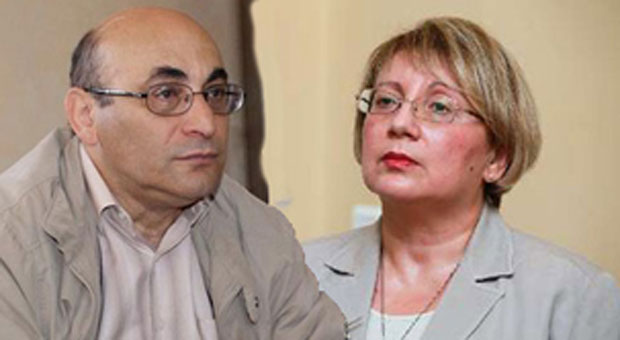
Arif and Leyla Yunus (Photo: HRHN)
Leyla Yunus — arrested 30 July 2014 — is the director of the Peace and Democracy Institute, which among other things works to establish rule of law in Azerbaijan. She has been charged with state treason (article 274 of the Criminal Code of the Republic of Azerbaijan), large-scale fraud (article 178.3.2), forgery (article 320), tax evasion (article 213), and illegal business (article 192). On 18 February, her pre-trial detention was extended for another five months. Her husband Arif Yunus was arrested 5 August 2014. Arif Yunus is facing charges of state treason and fraud. Both have had their initial three month pre-trial detentions extended.

Human rights and democracy activist Rasul Jafarov (Photo: Melody Patry)
Rasul Jafarov — arrested 2 August 2014 — one of the initiators and coordinators of the campaign “Sing for Democracy” and “The Art of Democracy”, advocated for the rights of political prisoners, actively participated in the International Platform “Civil Solidarity.” He is accused of: tax evasion (Article 192), illegal business (Article 213) and malpractice (Article 308). The charges carry a possible sentence of 12 years.
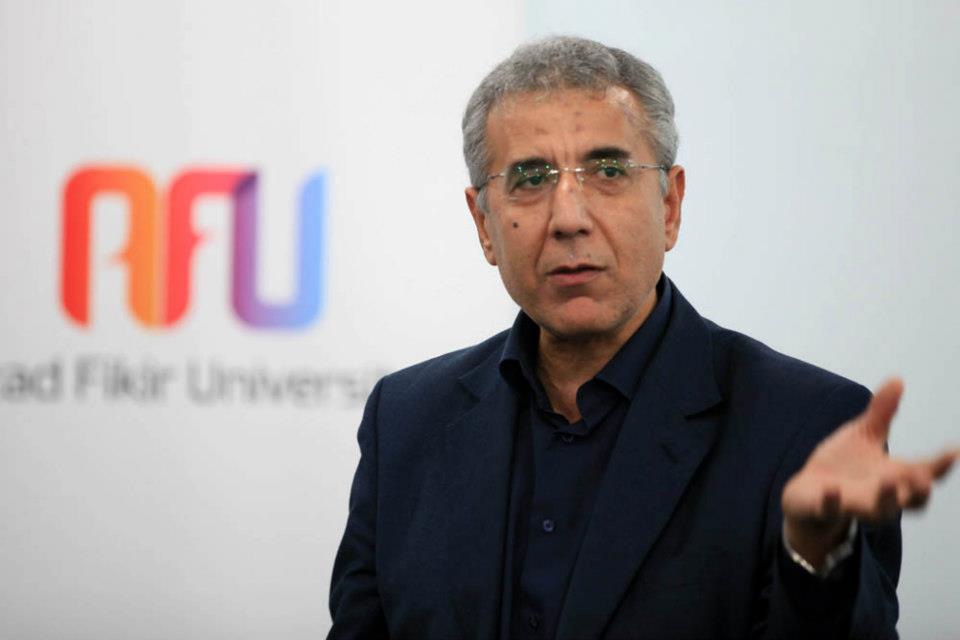
Lawyer Intigam Aliyev
Intigam Aliyev — arrested 8 August 2014 — is a human rights defender and a lawyer specialized in defending rights of citizens in the European Court of Human Rights. He is charged with Articles 213.1 (tax evasion), 308.2 (malpractice) и 192.2 (illegal business) of the Criminal Code. Index was heartened to hear that Aliyev was at least allowed to sit with his lawyers in court on Feb 3.
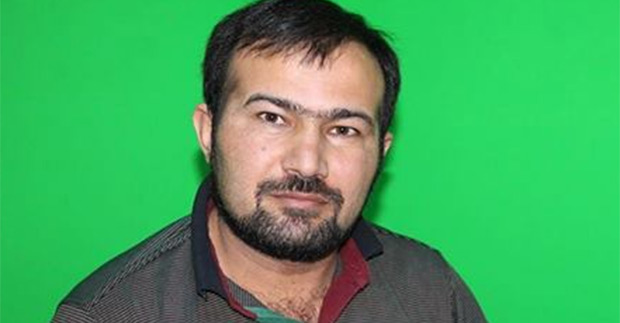
Journalist Seymur Hezi
Seymur Hezi — arrested 29 August 2014 — works for independent newspaper Azadliq and host of the news programme “Azerbaijan Hour”. He is a member of the opposition Popular Front Party. Index reported on January 29 that Hezi was sentenced to a five-year prison sentence on charges of “aggravated hooliganism” on 29 January.
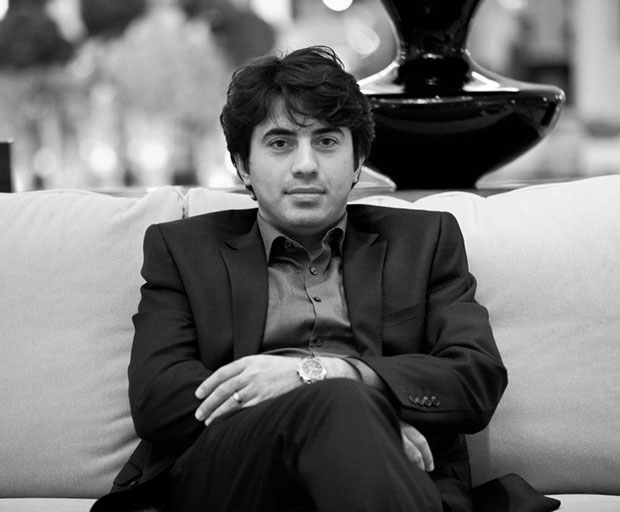
Emin Huseynov, journalist and human rights defender, director of the Azerbaijani Institute for Reporters’ Freedom and Safety (IRFS)
Emin Huseynov — went into hiding in August 2014 — is an internationally recognised human rights defender and leader of the Institute for Reporters’ Freedom and Safety (IRFS). IRFS is the leading media rights organisation in Azerbaijan and one of the main partner organisations of the Human Rights House Network in the country. Huseynov was charged with tax evasion, illegal business and abuse of authority after he went into hiding at the Swiss embassy. Florian Irminger, head of advocacy at the Human Rights House Foundation (HRHF), of which Index is a network member, called on Switzerland to continue to host Huseynov. “His location at the embassy is justified by the level of the repression in the country, the bogus charges brought against human rights defenders in Azerbaijan and the impossibility for them to defend themselves in court, due to the lack of independence of the judiciary and the harassment of their lawyers.”

Khadija Ismayilova
Khadija Ismayilova — arrested on 5 December — is an investigative journalist and radio host who is currently working for the Azerbaijani service of Radio Free Europe/Radio Liberty. She is a member of the Organized Crime and Corruption Reporting Project. She was arrested under charges of incitement to suicide, a charge widely criticised by human rights organizations. Ismayilova is currently being supported by two petition campaigns by Index on Censorship and Reporters Without Borders. On 13 Feb, lawyer Fariz Namazly told Contact.az that new charges have been filed. According to him, Ismayilova is charged under the Article: 179.3.2 (large-scale embezzlement), 192.2.2 (illegal business), 213.1 (tax evasion) and 308.2 (abuse of power.) The charges carry a possible sentence of 12 years.
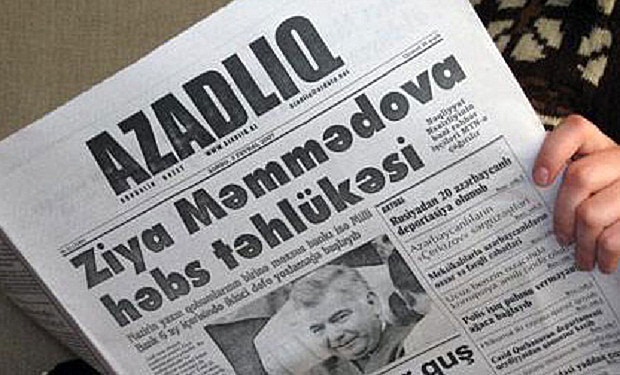
Award-winning newspaper Azadliq was forced to halt its print edition in July 2014 as its bank accounts were frozen. We reported on this in August 2014.
In September, the European Parliament adopted a resolution on the human rights situation in your country.
In November, Nils Muižnieks, the Council of Europe Commissioner for Human Rights, called his autumn 2014 mission to Azerbaijan one of the most difficult of his tenure. He wrote, “In late October I was in Azerbaijan, the oil-rich country in the South Caucasus, which just finished holding the rotating chairmanship of the 47-member Council of Europe. Most countries chairing the organisation, which prides itself as the continent’s guardian of human rights, democracy and the rule of law, use their time at the helm to tout their democratic credentials. Azerbaijan will go down in history as the country that carried out an unprecedented crackdown on human rights defenders during its chairmanship.”
You mention in your letter that individuals are not being arrested for their human rights work but it seems an astonishing coincidence that all these prominent human rights defenders should all be guilty of such an array of financial crimes. And that brings us full circle to the present. Since we received your letter, there have been several developments that we would like to brief you on:
On 29 January 2015, a provisional resolution before the CoE called attention to the cases of investigative journalist Khadija Ismayilova, human rights activist Emin Huseynov and the closure of Radio Free Europe/Radio Liberty. Further on in the resolution PACE was being asked to call on Azerbaijan to properly investigate the murders of journalists Elmar Huseynov (2005) and Rafiq Tagi (2011).
On 3 Feb, President Aliyev signed an amended media law that restricts press freedom by making it easier to shutter media outlets.
Just today, Reporters Without Borders released its World Press Freedom Index 2015, which places Azerbaijan at 162. That’s down 2 spots from last 2014.
We wish Azerbaijan’s commitment to a “free and diverse media” was more than just words and we will continue to report on these detentions – as we do globally – for as long as these words are not translated into action.
Best regards
Jodie Ginsberg
Chief Executive
Index on Censorship
9 Dec 2014 | Azerbaijan, Azerbaijan News, Magazine, News and features, Volume 43.04 Winter 2014

Campaigners outside the Baku court where members of N!DA were being sentenced (Photo: © Jahangir Yusif)
Azerbaijani activists Rasul Jafarov and Rebecca Vincent wrote an article for Index on Censorship magazine in December 2013 covering attacks on photojournalists, featured alongside a photo essay by photographers. A year later, the magazine asked Vincent to return to the issue, and cover how the past year has meant increasing risks for photographers, journalists and activists. One of the original photographers Jahangir Yusif returns to Index to illustrate the story. Jafarov is currently detained by the government, awaiting trial. Below, is a preview of the article to be featured in the next issue of the magazine.
Azerbaijani human rights defender Rasul Jafarov and I co-authored a piece for Index on Censorship magazine on behalf of the Art for Democracy campaign, focusing on the pressure faced by Azerbaijani photographers who covered risky topics such as corruption and human rights abuses. The piece ran alongside a photo story by some of the country’s most talented independent photographers.
That piece was typical of the work of the Art for Democracy campaign, which used all forms of artistic expression to promote democracy and human rights in Azerbaijan. Now, a year later, the human rights situation in Azerbaijan has worsened immeasurably. Rasul Jafarov was arrested and remains in detention, facing a serious jail sentence on fabricated and politically motivated charges, alongside a number of other prominent human rights defenders. Art for Democracy’s activities have been effectively suspended, as well as the operations of nearly all of the remaining human rights NGOs in the country.
Indeed, the past year has seen the most unprecedented of all human rights crackdowns to date in Azerbaijan, as the authorities work aggressively to silence the country’s few remaining voices. As a result, there are currently more than 90 reported political prisoners in Azerbaijan, including some of the country’s leading human rights defenders, lawyers, journalists, and bloggers.

Police and activists clash during the run-up to the presidential election (Photo: © Jahangir Yusif)
Rasul Jafarov’s case bears all the hallmarks of the pressure exerted on human rights defenders in Azerbaijan. He had been on the authorities’ radar for years, with his earlier work for the Institute for Reporters’ Freedom and Safety and, since December 2010, in his role as the founder and Chairman of the Human Rights Club. Perhaps most notably, Jafarov co-ordinated the Sing for Democracy campaign, which used the May 2012 Eurovision Song Contest, held in the capital Baku, as a platform to expose on-going human rights violations in the country and promote democratic change. He was the driving force behind the creation of the Art for Democracy campaign.
Alongside Art for Democracy’s activities, Jafarov worked to expose the situation of political prisoners. On the eve of the October 2013 presidential election the Human Rights Club released a list Jafarov had compiled of political prisoners, revealing a shocking 144 cases. The election itself was marred by widespread electoral fraud and saw incumbent President Ilham Aliyev re-elected for a third term in office.
In 2014, Jafarov continued working on the list and coordinating efforts among NGOs to achieve consensus and develop a joint version of the list, which would prove crucial to international advocacy efforts. Along with some of the other human rights defenders who have since been targeted, Jafarov repeatedly raised the issue at the Council of Europe, and advocated the appointment of a new special rapporteur to take up the work of a previous rapporteur whose efforts were defeated by lobbying from the Azerbaijani government. Jafarov also announced plans to launch a new campaign, Sports for Rights, ahead of the first European Games, which are due to be held in Baku in June 2015.
As a result of these activities, Jafarov faced a number of pressures from the authorities, but he persevered. He was aware of the risks, but also remained hopeful that the situation in his country would improve. He was dedicated to his work defending the rights of others and attempting to hold his government to account. Indeed he remains passionately committed to these aims even now, in detention.
After having his bank account frozen and being prevented from travelling outside of the country, Jafarov was arrested on 2 August and charged with illegal entrepreneurship, abuse of office, and tax evasion. The fabricated and politically motivated charges were similar to those used against other prominent human rights defenders. Some of the charges were linked to the fact that the Human Rights Club remained unregistered, despite the fact that Jafarov had been attempting to register the NGO with the state for more than three years, an issue pending consideration by the European Court of Human Rights. Jafarov remains held at the Kurdekhani detention centre, awaiting trial.
Jafarov is only one of many prominent human rights defenders to have been targeted in Azerbaijan in recent months. On 26 May, the chairman of the Election Monitoring and Democracy Studies Centre Anar Mammadli, was sentenced to five and a half years in jail, and his colleague Bashir Suleymanli to three and a half years on charges including illegal entrepreneurship, abuse of office, and tax evasion. Elnur Mammadov of the International Cooperation of Volunteers’ Union was also sentenced to two years on probation.

Protesters campaign for the release of imprisoned activists (Photo: © Jahangir Yusif)
On 30 July, the head of the Institute for Peace and Democracy, Leyla Yunus, was arrested on politically motivated charges of treason, fraud, forgery, tax evasion, and abuse of office. Her husband, an activist in his own right, Arif Yunus, was arrested on 5 August on charges of treason and fraud. On 8 August, the head of the Legal Education Society Intigam Aliyev was arrested on similar politically motivated charges: illegal entrepreneurship, abuse of office, and tax evasion. There are now a total of nine human rights defenders behind bars in Azerbaijan. In addition, the whereabouts of the director of the Institute for Reporters’ Freedom and Safety Emin Huseynov have been unknown since 8 August, the day his organisation’s office was searched and sealed shut by police.
Parallel to these arrests, the authorities have stepped up other forms of pressure against both local and foreign NGOs, making it nearly impossible for organisations working on issues related to human rights and democracy to continue operating in the country. This has resulted in the closure or suspension of activities of many of the remaining human rights NGOs in the country. Parliament continues to tighten legislation related to the operations and financing of NGOs, cutting off vital sources of funding for independent groups and making it difficult to carry out even routine activities.
At the same time, other violations continue, such as pressure against the few remaining opposition and independent media outlets in the country. Prominent investigative journalist Khadija Ismayilova was arrested on 5 December, as government officials and their supporters employed new tactics in their relentless attempts to silence her. Journalists Seymur Khaziyev and Khalid Garayev, both presenters of the Azerbaijan Hour programme, were arrested on 29 August and 29 October respectively, bringing the current total of journalists and bloggers behind bars to 15. The Azadliq newspaper, the country’s main opposition daily newspaper, teeters on the brink of closure, facing serious financial hardship because of excessive fines from civil defamation lawsuits and a number of other pressures from the authorities.
In an ironic twist of fate, in the midst of this unprecedented crackdown, Azerbaijan in May 2014 assumed the chairmanship of Council of Europe, a body whose very purpose is to safeguard human rights and democratic values. Sadly, during Azerbaijan’s chairmanship, the Council of Europe, and, the broader international community, has done little to hold the government to account for its human rights obligations.
Now, with Jafarov and so many of his colleagues behind bars and the organisations they represent effectively paralysed, concrete international support is needed more than ever. Azerbaijan’s few remaining independent voices are under siege and will not be able to hold out much longer.
©Rebecca Vincent
www.indexoncensorship.org
Rebecca Vincent is a human rights activist and former diplomat who writes regularly on human rights issues in Azerbaijan. She served as advocacy director of the Art for Democracy campaign until April 2014
Jahangir Yusif is a photo-journalist whose work was featured in the original article 12 months ago, read the original article here.
Index recently was part of a protest at the Azerbaijani embassy, read more about it here.
This article is from the upcoming winter edition of Index on Censorship magazine. Subscribe to Index on Censorship magazine by Dec 31, 2014 for 25% off a print subscription.
This article was posted on 9 December 2014 and appears in print as Azeri attack in the Winter 2014 Index on Censorship magazine.












